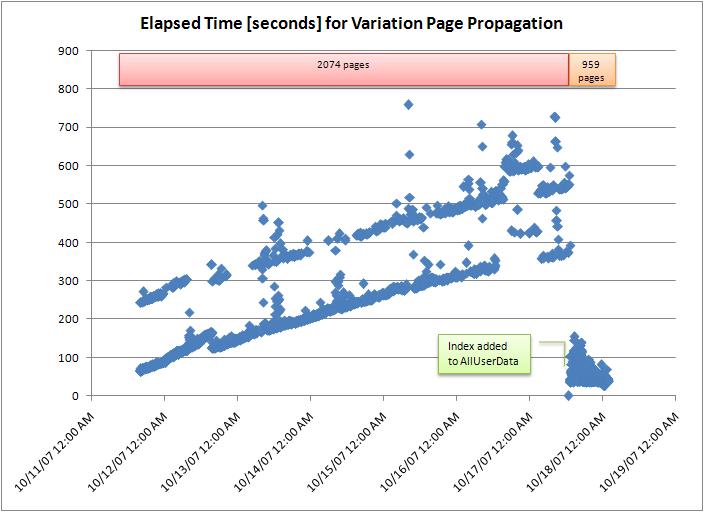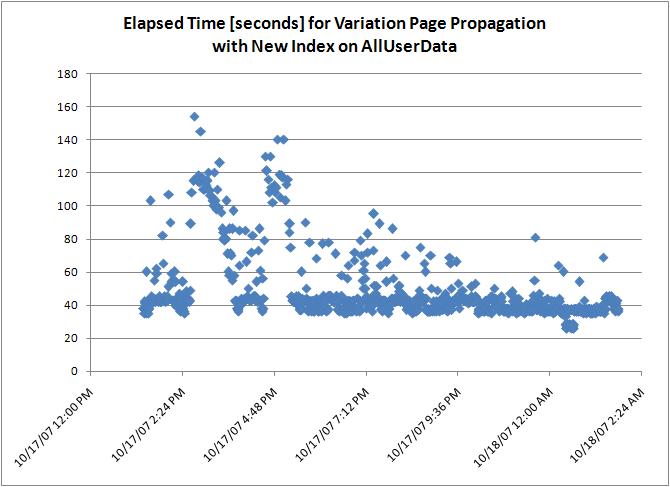Dumping MOSS 2007 Variations - Part 3
In part 1 and part 2 of this series, I talked about some major issues with the variations feature in Microsoft Office SharePoint Server (MOSS) 2007 that caused my current customer to abandon using them on their new Internet site.
Here is a brief summary of the three major issues we encountered with variations prior to deployment:
- Incompatibility of out-of-the-box (OOTB) content types and variations (refer to part 1 for more details)
- Page propagation slows down dramatically as the number of pages grows (refer to part 2 for more details)
- Attempting to create a new variation label after creating a large number of sites and pages results in an out-of-memory error on the server
I have not previously covered this last problem in the previous posts. If you manage to circumvent the first two problems, at some later point in time it is certainly possible you will need to add a new label to support another language (or, as in our case, perhaps you discover that you need to recreate a label because someone -- who shall remain nameless -- accidentally deletes one of the variation sites by mistake). [If the latter is the case, hopefully you'll be fortunate like we were and this won't happen on your PROD site.]
If you are using variations, and you happen to notice your OWSTimer.exe process consuming 1.5 GB of memory (like we did), then problem #3 is likely the culprit. Fortunately, the variations memory leak that causes this has already been fixed in a QFE (and, I believe, is scheduled to be included in MOSS 2007 Service Pack 1). Based on the SRX (service request) that I read, it appears this can be obtained earlier through the normal QFE process. However, we never pursued obtaining the patch and installing it in our environment.
[Update (2007-11-28): According to a follow-up by Stefan Goßner, only part of this bug is fixed in SP1. You'll need a post-SP1 QFE to completely resolve the out-of-memory issue.]
As I have mentioned before, the decision to abandon variations was not an easy one to make and it is not possible to point to one particular problem as the proverbial "straw."
Ultimately, though, I believe the bulk of the decision fell on performance, or more accurately, the lack thereof. Take a look at the following graph, which shows the elapsed time required to propagate each FAQ page from the source en-US site to the four variation sites (ja-JP, ko-KR, zh-CN, and zh-TW).
Figure 1: Elapsed Time for Variation Page Propagation
Notice how the time required to propagate each page increases substantially as the number of pages increases. As I pointed out in part 2, I believe this is due to the use of the Relationships List (stored in the AllUserData table) in combination with the content deployment API. Also notice how the time required to propagate each page dropped substantially after adding the index described in part 2. Lastly, notice how long it took to propagate 2074 pages before the index, compared with the remaining 959 pages after the index was added.
The following graph "zooms in" on the time period after the index was added.
Figure 2: Elapsed Time for Variation Page Propagation
It seems like it took SQL Server a little while to optimize based on the new index, but it levels out around 40 seconds per page. Compared with the 10-minute propagations before the new index on AllUserData, this seems fantastic. However, that is only a relative comparison.
The problem is that, as I described in part 2, we are currently on "v2" of our solution -- which has about 3,700 pages (of which, about 3,200 are FAQs). However, the "v3" solution is going to have about 20,000 more pages. Consequently, even at an optimistic 40 seconds per variation page propagation, we were forecasting about 9-1/2 days for migrating the pages from the legacy system (20,000 pages x 40 seconds/page / 60 seconds/minute / 60 minutes/hour / 24 hours/day). However, we really don't know the accuracy of that estimate without additional testing.
The bottom line is that, even with the index I proposed in part 2, the content deployment (a.k.a. PRIME) API used by the variations feature to propagate pages incurs signficant overhead.
As a comparison, I believe our last FAQ migration (without variations) completed in about 4 hours for 16,000 pages (3,200 pages x 5 languages). Note, however, that in order to achieve this throughput, we had to forego all of the value-add of the variations feature, such as automatically creating a new FAQ on the ja-JP, ko-KR, zh-CN, and zh-TW sites (in preparation for translation), when the corresponding FAQ is approved on the en-US site.
Like I said, it was a difficult decision, and a painful one at that.

